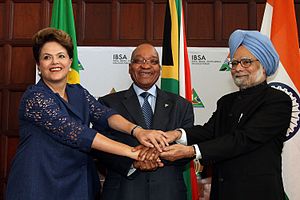IBSA Dialogue Forum
The IBSA Dialogue Forum plays an increasingly important role in the foreign policies of India, Brazil, and South Africa.
[3] The Ministers highlighted their priorities on promotion of social equity and inclusive growth by reiterating the need for tackling hunger and poverty by means of effective implementation of government schemes.
The declaration also highlights the need for promoting family-run farms, food security, health, education, human rights and environmental protection.
They also decided to further intensify dialogue at all levels, when needed, to organize meetings of top officials and experts responsible for issues of mutual interest.
It also aims at increasing the trade opportunities among the three countries, as well as facilitate the trilateral exchange of information, technologies and skills to complement each other strengths.
It also aims to explore avenues to promote cooperation in broad range of areas, which include agriculture, climate change/global warming, culture, defence, education, energy, health, information society, science and technology, social development, trade and investment, tourism and transport.
[4] The IBSA economic ministers met in New Delhi in March 2005 and agreed on a mechanism to identify and eliminate non-tariff barriers which impede mutual trade.
[4] Some of the mechanisms considered include customs cooperation, sharing of expertise in the field of energy, agriculture, food processing, tourism and financial and banking services.
Development of trans-shipment facilities for creation of a South-South highway, which integrates sub-regional connection between Mercosur, Southern African Customs Union and Indian regions, is a priority area for the Working group.
[4] Yashwant Sinha, Celso Amorim and Dr. Nkosazana Dlamini-Zuma, the foreign ministers of India, Brazil and South Africa respectively, met in New Delhi on 4 and 5 March 2003 for the first meeting of the Trilateral Commission of the IBSA Dialogue Forum.
They agreed to intensify their cooperation at the IAEA with a view to ensure growth and development of use of nuclear energy for peaceful purposes under appropriate safeguards.
On the Israel–Palestine issue, the three countries urged an early resumption of dialogue on the basis of UN Security council resolutions, Arab League peace Initiative and the Quartet roadmap.
[5] Recalling the Brasilia declaration, the ministers agreed upon the sharing of expertise in diverse areas such as food security, health, education, human rights etc.
[5] The foreign ministers of the three countries met in Cape Town on 10 and 11 March 2005 for the second meeting of the Trilateral Commission of the IBSA Dialogue Forum.
The following issues were discussed: The ministers reiterated their commitments toward achieving the Millennium Development Goals by 2015 as their core strategy in their collective fight against hunger, poverty, and other problems ailing their society.
[6] The ministers expressed their support for creation of an Asian-African business summit which would focus on promoting and strengthening the African private sector.
The ministers also welcomed the efforts towards integration in the Latin America and Caribbean region and in this regard recognised the significance of the creation of the South American Community of Nations (CASA).
[6] Anand Sharma, Celso Amorim and Dr. Nkosazana Dlamini-Zuma, the foreign ministers of India, Brazil and South Africa respectively, met in Rio de Janeiro on 30 March 2006 for the third meeting of the Trilateral Commission of the IBSA Dialogue Forum.
[7] The Ministers took note of the broader objectives of the European Union proposed Registration, Evaluation and Authorization and restriction of Chemicals (REACH) Legislation, in respect of the protection of human health and the environment.
The ministers urged the EU to give due consideration to these consequences and also ensure that REACH does not become a Technical Barrier to Trade (TBT).
The ministers agreed with the committee's recommendation of signing additional agreements with UNDP in order to clarify rights and obligations of both parties.
Keeping this in perspective, they expressed their satisfaction that Mercosur will be proposing to Southern African Customs Union and India the creation of a Working Group to explore the modalities of a Trilateral Free Trade Agreement (T-FTA) among them.
Logistics, custom procedures, lack of information and distances were identified as main barriers which needed to be eliminated for the trilateral trade to flourish.
Problems regarding customs procedures were sought to be tackled by ensuring more cooperation among the governmental institutions in order to simplify many regulations and streamlining the process.
The private sector was also of the view that number of flights between India, Brazil and South Africa need to be increased, which eliminate the barrier of distances and lack of information no problem.


